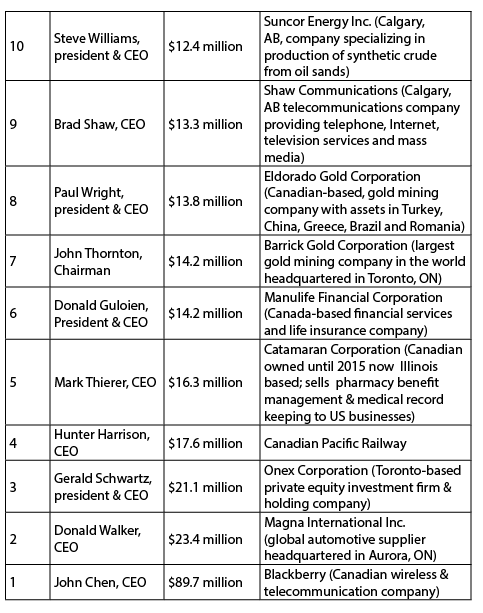In 2014, the Canadian Centre for Policy Alternatives reported the top 100 richest CEOs in Canada earned a combined total of $896 M for this one year of work. On the other hand, the average full-time employee in Canada made $48,636 in that same time period. To more specifically illustrate the current wage disparity in Canada, I placed our 10 highest-paid CEOs in the table below.
Canada’s 10 Highest-paid CEO’s
 Clearly, I do not understand what would motivate someone to negotiate an $89.7 M salary when so many countrymen and women are without homes, food and jobs and when his or her workforce is paid nickels and dimes in comparison. Furthermore, I am puzzled as to who and what determines the economic value of one’s work.
Clearly, I do not understand what would motivate someone to negotiate an $89.7 M salary when so many countrymen and women are without homes, food and jobs and when his or her workforce is paid nickels and dimes in comparison. Furthermore, I am puzzled as to who and what determines the economic value of one’s work.
For instance, how does a corporation like Manitoba Telecom Services Inc. equate retired CEO Pierre Blouin’s yearly contribution to be worth $7,782,241 M (49th on the highest paid list, outdone by #48 Air Canada CEO coming in at $7,999,951 M)? And finally, how is it that we find ourselves in a place where the massive income gap between the “bottom billion” on the planet and the top earning 1% continues to enlarge — CEOs were paid 22% more in 2014 than 2008?
This massive income gap between CEOs and the workforce continues to climb regardless of economic recession, poor corporate performance, political pressure or public outrage.
Governments and citizens around the world continue to focus attention
on the astronomical salaries pocketed by CEOs. Especially in the U.S.,
there has been particularly strong public and political outrage at the
payment of enormous bonuses to the executives who have overseen
the wiping out of billions of dollars in shareholder value since the crash
of 2007–08. Hugh Mackenzie, Staying Power: Ceo Pay in Canada
In 2014, Forbes reported on research analyzing 20 years of CEO compensation and corporate performance. The conclusion reached was, “the more CEOs got paid, the worse their companies did.” So, the bad news is that despite the public’s reaction to executive greed, no political or boards of directors’ leadership and no personal self-restraint is apparent. Even the scads of data (over 200 studies) depicting declining social relations (child conflict, homicide, imprisonment, social capital, trust), human capital (child well-being, high school drop outs, math and literacy scores, social mobility, teenage births) and health (drug abuse, infant mortality, life expectancy, mental illness, obesity) is not motivating a move toward greater income equity.
The questionably good news is we have witnessed this pattern of inequality throughout our history, and we know a boiling point is eventually reached wherein revolutionary change occurs.
[I]n our democracy, 1% of the people take nearly a quarter of the nation’s income …
In terms of wealth rather than income, the top 1% control 40% … [as a result] the top
1% have the best houses, the best educations, the best doctors, and the best lifestyles,
but there is one thing that money doesn’t seem to have bought: an understanding that
their fate is bound up with how the other 99% live. Throughout history, this is something
that the top 1% eventually do learn. Too late. Joseph Stiglitz
So, if we wish to continue down the path of income inequity, we have the promise of events arising not dissimilar to the French Revolution. Proof in point, the American run for presidency is already embroiled in a class war between the haves led by billionaire Donald Trump and the have-nots rallying behind democratic socialist Bernie Sanders.
It all began in the 1970s … Once wages detached from productivity, the rich pro-
gressively got richer. They used their wealth to reduce taxes on capital, roll back
critical regulations, break up the unions, install their own lapdog politicians, push
through trade agreements that pitted US workers against low-paid labor in the
developing world, and induce their shady Central Bank buddies to keep interest
rates locked below the rate of inflation so they could cream hefty profits off
gigantic asset bubbles. Now, 40 years later, they own the whole shooting match,
lock, stock and barrel. And it’s all because management decided to take the lion’s
share of productivity gains which threw the whole system off-kilter undermining
the basic pillars of democratic government. Mike Whitney
It is fair to say the world is witnessing the implosion of the United States of America in its decline from world super-power status into Fascism — ownership of Government by an individual, by a group, or by any other controlling private power. (Franklin D. Roosevelt: “Message to Congress on Curbing Monopolies,” April 29, 1938. The American Presidency Project.)
Historically, any polarization between wealthy and poor results in revolutionary change — increasing violence and outright war as well as mass migrations to safer nations. All of which echoes what occurs in Syria today.
Having already passed through my less rational rebellious youth, I hope for a kinder, more peaceful transformation. For certainly, transform we must. In countries like Japan and Sweden, quite different tactics (more equal pay throughout corporations versus higher corporate taxation) have proven to reduce the income gap and benefit both the top and bottom of the income scale.
Regardless of the tactics chosen to institute equality, what is more significant is recognizing how vital it is to do so and soon. The increasing acts of violence and terrorism witnessed around the world may just be our version of the French Revolution on a global scale.
What one step can you take to reduce income inequity and increase overall well-being?
For more on “saying Yes to what you want,” click here.





